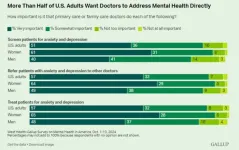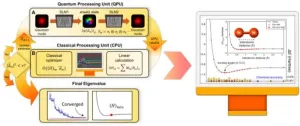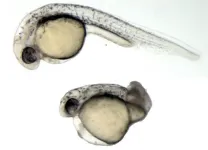(Press-News.org) A potentially life-changing heart condition, dilated cardiomyopathy, can be caused by the cumulative influence of hundreds or thousands of genes and not just by a single “aberrant” genetic variant, as was previously thought, finds a new study led by researchers at UCL (University College London), Imperial College London and the MRC Laboratory of Medical Sciences.
Dilated cardiomyopathy (DCM) is a condition in which the heart becomes progressively enlarged and weakened, reducing its ability to pump blood efficiently. It is estimated to affect up to 260,000 people in the UK (one in every 250 individuals) and is the leading cause of heart transplantation.
Previously, it was thought that dilated cardiomyopathy was mostly caused by faulty copies of a single gene that can be passed down through families, even though in more than half of patients no faulty gene is identified.
The new study, published in the journal Nature Genetics, found that about a quarter to a third of the risk of dilated cardiomyopathy could be accounted for by the small effects of many thousands of genetic differences scattered throughout the genome.
Importantly, the researchers also developed a polygenic risk score to assess a person’s likelihood of developing dilated cardiomyopathy based on the many small effects of these genes.
They found that those with the highest genetic risk score (in the top 1%) had a fourfold risk of developing dilated cardiomyopathy compared to those with an average risk score.
In addition, the researchers found that these cumulative small genetic effects provided an important explanation for the puzzle that some people with a faulty gene copy develop cardiomyopathy, while others don’t.
Co-senior author Dr Tom Lumbers (UCL Institute of Health Informatics) said: “When cardiomyopathy runs in a family, it can be very worrying for family members who don’t know whether they are going to develop disease. Our findings could allow clinicians to better predict disease risk for patients and their families.
“Our study also heralds a new way of thinking about the genetics of this heart disease. Instead of being caused by a single genetic spelling mistake, in some patients the condition is more like common diseases such as coronary artery disease, where many genetic differences collectively contribute to risk.
“Understanding the small effects of many genes across the genome also helps us to identify those patients carrying a faulty gene copy at highest risk of developing the disease. This higher-risk group can be followed more closely, and offered early opportunities to participate in clinical trials testing preventive treatments. Identifying people at the highest risk has been challenging until now.”
Professor James Ware (Imperial College London & MRC Laboratory of Medical Sciences) added: “We expect that our findings will improve the precision of clinical genetic testing and will increase the number of patients to whom a genetic explanation can be given.”
For the study, the research teams worked with collaborators from around the world to collect and analyse the results of 16 existing studies alongside new data, comparing the genomes of 14,256 people who had dilated cardiomyopathy with more than a million people who did not have the disease.
By comparing the genomes of those with and without the disease, the team were able to identify 80 areas of the genome with a likely link to the disease, the majority of which had not been previously reported, as well as 62 specific genes within those areas that likely had a link to the disease.
They developed a polygenic risk score, based on the genome association scan, and applied it to a separate dataset of 347,585 individuals in UK Biobank. They found that people with a rare disease-causing variant were four times more likely to develop disease (7.3% to 1.7%) if their polygenic risk score was in the top 20% compared to those whose risk score was in the lowest 20%.
Professor Ware said: “We still have a lot of work to do to understand how these specific newly identified genes influence the risk of developing cardiomyopathy, but they are already shedding light on biological processes underlying the condition, and we hope that some will give new leads on possible treatments.
“One of our next steps is to explore integrating polygenic risk scores into genetic testing, to provide more people with a genetic explanation for their disease and a more precise assessment of disease risk.”
Professor Metin Avkiran, Director of International Partnerships and Special Programmes at the British Heart Foundation, said: “Dilated cardiomyopathy is a debilitating condition with few treatment options once it has developed.
“This study is a big step forward in our understanding of the genetics of DCM, providing a clearer picture of individual risk in people who do not carry a known disease-causing mutation in a single gene. These promising early findings could lay the foundation for more personalised monitoring and care, as well as revealing potential targets for the development of new treatments.”
The research team are supported by funding from the Medical Research Council, Sir Jules Thorn Charitable Trust, British Heart Foundation including their Big Beat Challenge award to CureHeart, Wellcome Trust, the National Institute for Health Research (NIHR) Imperial College Biomedical Research Centre, NIHR Royal Brompton Cardiovascular Biomedical Research Unit, National Heart Lung Institute Foundation; Royston Centre for Cardiomyopathy Research, Rosetrees Trust, GenMED LABEX, the UCL British Heart Foundation Research Accelerator and the NIHR University College London Hospital Biomedical Research Centre.
END
New genetic explanation for heart condition revealed
2024-11-21
ELSE PRESS RELEASES FROM THIS DATE:
Poor mental health linked to browsing negative content online
2024-11-21
People with poorer mental health are more prone to browsing negative content online, which further exacerbates their symptoms, finds a study led by UCL researchers.
The relationship between mental health and web-browsing is causal and bi-directional, according to the Wellcome-funded study published in Nature Human Behaviour.
The researchers have developed a plug-in tool* that adds ‘content labels’ to webpages—similar to nutrition labels on food—designed to help users make healthier and more informed decisions about the ...
People with migraine at high risk of depression during pandemic
2024-11-21
Toronto, ON – A recent longitudinal study from the University of Toronto reveals the mental health consequences of the COVID-19 pandemic on older adults living with migraine.
Using a sample of more than 2,000 older adults with migraine from the Canadian Longitudinal Study on Aging, researchers examined changes in depression status among this population during the pandemic. More than 1 in 7 older adults with migraine experienced depression for the first time during the COVID-19 pandemic, while approximately 1 in 2 with a previous history of depression experienced a recurrence during this period.
“People ...
Climate-driven hazards increases risk for millions of coastal residents, study finds
2024-11-21
A new study published in Nature Climate Change estimates that a 1-meter sea level rise by 2100 would affect over 14 million people and $1 trillion worth of property along the Southeast Atlantic coast, from Norfolk, Virginia, to Miami, Florida.
The study assesses the cumulative impact of multiple climate-driven coastal hazards, including sea level rise, flooding, beach erosion, sinking land, and rising groundwater, all of which are expected to worsen significantly by the end of the 21st century.
The scale of these interconnected ...
Females sleep less, awaken more frequently than males
2024-11-21
Females sleep less, wake up more often and get less restorative sleep than males, according to a new animal study by CU Boulder researchers.
The findings, published in the journal Scientific Reports, shed new light on what may underlie sleep differences in men and women and could have broad implications for biomedical research, which for decades has focused primarily on males.
“In humans, men and women exhibit distinct sleep patterns, often attributed to lifestyle factors and caregiving roles,” said senior author Rachel Rowe, assistant professor of integrative physiology. “Our results suggest that biological ...
Most Americans want primary care providers to address mental health
2024-11-21
WASHINGTON, D.C. — Nov. 21, 2024 — A majority of Americans (70%) say they would prefer to be asked about both their physical and mental health during medical appointments with their primary care providers (PCPs). The finding from the new West Health-Gallup Survey on Mental Health in America comes as more than one in five U.S. adults, or 59.3 million people, were living with a mental illness in 2022, and little more than half of them (50.6%) received treatment within the prior year.
According to the survey, majorities of men (65%) and women (76%) are eager to discuss both their mental and physical health with their primary ...
Millions of Americans hurt by others’ drinking, drug use: study
2024-11-21
by Amy Norton
PISCATAWAY, NJ – The risks of alcohol and other drug consumption to the user are well known, but many Americans--nearly 160 million--say they’ve been harmed by someone else’s substance use, according to a new study in the Journal of Studies on Alcohol and Drugs.
In a national survey of U.S. adults, researchers found that 34% said they’d ever suffered “secondhand harm” from someone else’s alcohol use--ranging from marriage and family problems to financial fall-out to being assaulted or injured in a drunk-driving accident. Meanwhile, 14% said they’d been harmed ...
Plasma-derived atomic hydrogen advances low-temperature CO2 methanation at high yield
2024-11-21
Plasma-derived atomic hydrogen (PDAH) enables low-temperature carbon dioxide methanation reaction through the Eley−Rideal-type reaction channel, improving methane yield at low temperatures, as shown by scientists at Science Tokyo. The findings underscore the potential of PDAH in advancing sustainable carbon dioxide recycling methods and optimizing other catalytic hydrogenation reactions, providing a promising avenue for improved efficiency in various energy and environmental technologies.
Despite declining reserves and significant carbon dioxide (CO2) emissions contributing to ...
Photon qubits challenge AI, enabling more accurate quantum computing without error-correction techniques
2024-11-21
The just-announced Nobel Prize in Chemistry was awarded to University of Washington Professor David Baker, Google DeepMind CEO Hershavis, and Principal Investigator John Jumper for their work using AI to predict the structure of proteins, enabling the discovery of new drugs and new materials. In an era where AI and data are driving the scientific revolution, quantum computing technology is emerging as another game-changer in the development of new drugs and new materials.
Dr. Hyang-Tag Lim's ...
Single gene causes embryo notochord deformity in zebrafish
2024-11-21
Can a single protein-encoding gene determine whether a vertebrate embryo develops normally? Yes, according to Osaka Metropolitan University researchers, who found that suppression of Pcdh8 is essential for the notochord to elongate properly in zebrafish.
Graduate School of Medicine Dr. Masatake Kai and Professor Makoto Kondo focused on this paraxial protocadherin (PAPC), which is excluded when dividing cells migrate and form the notochord in the embryo.
In the experiments with zebrafish embryo, when this PAPC is not ...
Sylvester Cancer Tip Sheet - Nov 2024
2024-11-21
NOVEMBER TIP SHEET - SYLVESTER COMPREHENSIVE CANCER CENTER
CANCER RESEARCH
Sylvester Researchers to Share Insights at ASH 2024 Annual Meeting
Dozens of physician-scientists and other investigators from Sylvester Cancer will share their insights at ASH 2024, the American Society of Hematology’s 66th-annual meeting in San Diego, Dec. 7-10. Sylvester researchers will be involved in more than 130 presentations, including oral, poster and special sessions. Additionally, Sylvester Director Stephen D. Nimer, MD, will receive the 2024 ASH Mentor Award for his exemplary work in mentoring trainees and colleagues.
BREAST CANCER
The Cancer Journey: Asking For and Accepting Help
Journalist ...





